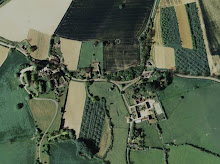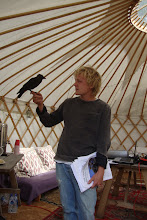
There's nothing like spending a few afternoons trespassing in orchards to clear the smoke of the city from your lungs! I have been missing-in-action doing a masters course in London, but now I'm back wandering the groves...

I had previously mentioned a mysterious dessert apple called the Orleans Reinette (or Reinette d'Orleans). Back in Cambridge, Professor John Parker, the then Director of the Botanic Gardens, had recommended this as the best apple he had ever tasted. Many others agree. Orleans Reinette was first described in 1776 and is now grown throughout Europe but it remains in Britain as something of a rarity. It has proven to be illusive to track down. With apple season fully underway, last Tuesday I tagged along to a filming event with one of the world authorities on apples in his own private orchard.

This is Barry in his orchard in Wytham in which he has collected around 130 different apple varieties. Barry is an Emeritus reader in plant sciences from Oxford University and author of 'The History of the Apple'. He is doing his thing for a Dutch film crew that are producing a series called 'Paradise' that is all about the future of food (it is the brainchild of a very interesting scientist, director and writer: Louise Fresco).

In 1929, the famous pomologist Edward Bunyard described how '...it seems to come from the Low Countries, where we first meet with it in 1776. Its brown/red flush and glowing gold do very easily suggest that if Rembrandt had painted a fruit piece he would have chosen this apple. In the rich golden flesh there is a hint of the Ribston flavour, much of the Blenheim nuttiness, and an admirable balance of acidity and sweetness which combine, in my opinion, to make the best apple grown in Western Europe....as a background for an old port it stands solitary and unapproachable.'

It's an unbelievable apple. (It stands solitary AND unnapproachable!) Really low acidity and fantastic subtle undertones of vanilla that emerge as you chew. It's also cracking with a mature (= runny) English goat's cheese a drop of Sauternes. Those slices in the background are Brownlee's Russet - notice how the Orleans Reinette does not go brown (oxidation) when its flesh is exposed to the air. Go out and find one!


